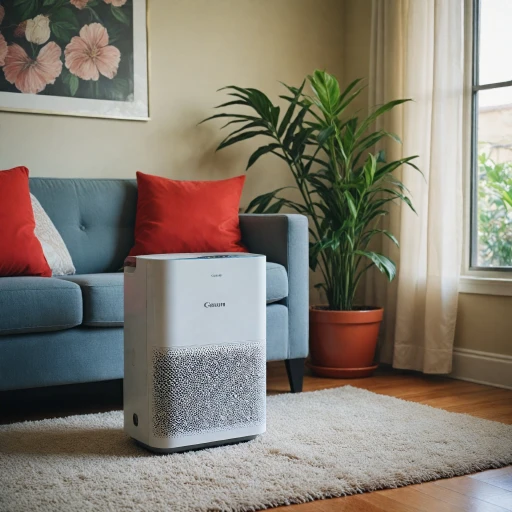Understanding Dynamic Air Cleaners
Exploring Dynamic Air Filtration Technology
Dynamic air cleaners have increasingly become a staple in residential and commercial HVAC systems aimed at enhancing air quality. At the core of their design lies a unique filtration approach that sets them apart from traditional models.
Understanding how these cleaners operate requires a closer view at key components. Dynamic media filters are essential to these systems. These filters take advantage of synthetic materials and electrically charged media to capture a wide array of airborne pollutants more effectively than conventional filters. This custom approach to air cleaning can accommodate various environments, making them suitable for both OEM solutions and commercial applications.
Additionally, the carbon elements in dynamic air cleaners further amplify their ability to eliminate volatile organic compounds (VOCs) from the air, thus producing cleaner and more breathable indoor environments. While considering systems that include dynamic air cleaning, it is vital to understand product performance and the policies around parts and custom integration to choose a product that fits specific needs.
Maintaining these systems involves understanding the privacy and operational policies incorporated by manufacturers. Whether you are contemplating a new dynamic air filter for home use or a larger commercial establishment, it is crucial to have access to support and contact information to facilitate seamless functionality. For an extended view on improving air quality, you might consider reading about
enhancing indoor air quality with smoke diffusers.
Key Features of Dynamic Air Cleaners
Features Highlighted in Dynamic Cleaners
Dynamic air cleaners come equipped with a range of features that enhance their functionality and effectiveness. When exploring these air cleaning systems, you'll notice several key components designed to improve air quality efficiently:
- Customizable Filters: Dynamic air cleaners often support custom filter options. Whether you're targeting specific allergens or looking for advanced media solutions, these systems allow you to choose filters tailored to your needs.
- Carbon-Based Filtration: Many dynamic air cleaners incorporate carbon filters to remove odors and volatile organic compounds (VOCs), contributing to a cleaner and fresher indoor environment.
- High-Quality Parts: Built with OEM-supported parts, dynamic cleaners are designed for durability and long-term performance in both residential and commercial settings. This ensures ongoing effectiveness in maintaining air quality.
- Comprehensive Systems: Dynamic air cleaners are often part of broader air solutions that provide robust air cleaning without compromising on performance, offering flexibility in integration with existing HVAC systems or standalone operation.
For a deeper view of how air purifiers, including dynamic models, can help combat issues like
mould, it's essential to understand the effectiveness of each feature. This background complements the benefits and challenges of incorporating dynamic cleaners, which we'll discuss further.
Staying informed about the quality and features of these products can help you find the right solution for your indoor air challenges. Whether dealing with privacy policy concerns or seeking parts' support, knowing the features of dynamic air cleaners can facilitate better decision-making.
Benefits of Using a Dynamic Air Cleaner
Transform Your Environment with Advanced Air Systems
Dynamic air cleaners offer a multitude of benefits, significantly contributing to improved indoor air quality. Their innovative design and technology enable them to effectively and efficiently filter out various pollutants, ensuring a healthier living or working environment.
- Enhanced Air Quality: One of the primary advantages of using a dynamic air cleaner is its ability to remove a wide range of pollutants, including dust, allergens, bacteria, and even volatile organic compounds. Advanced filtration systems, often incorporating media such as high-efficiency carbon filters, play a crucial role in achieving this.
- Reduced Need for Maintenance: These cleaners are typically designed with custom OEM parts and support systems that reduce the frequency of maintenance. This means you'll spend less time and effort on upkeep, allowing you to focus on other priorities.
- Commercial and Residential Versatility: Dynamic air cleaners are versatile in their application, suitable for both commercial and residential settings. Their adaptable configurations ensure that they meet diverse air quality needs across various spaces.
- Improved Energy Efficiency: Many dynamic air cleaners are built to be energy-efficient, helping to reduce overall energy consumption while maintaining optimal performance. This is a critical factor for those looking to minimize their environmental footprint without compromising air quality.
- Compliance with Safety and Privacy Standards: Ensuring that products adhere to strict privacy policies and safety guidelines is another advantage of dynamic air solutions. These cleaners come with comprehensive policy support, ensuring both your privacy and safety are prioritized.
However, it's crucial to consider some challenges and potential limitations associated with these products. Evaluating these aspects side by side with advantages offered by other methods of air purification can provide a more comprehensive view. For individuals focusing on reducing specific concerns, such as dust, exploring how a dynamic air cleaner can effectively address these issues can be particularly beneficial.
For more detailed insights on the effectiveness of air purifiers for dust management, feel free to
explore this guide.
Challenges and Considerations
Potential Limitations and Factors to Consider
Selecting a dynamic air cleaner involves weighing its challenges and considerations. Although these systems offer numerous benefits, it is crucial to evaluate aspects that might impact their performance or suitability for a specific environment.
- Initial Investment: Dynamic air cleaners often require a higher upfront cost compared to other air purification solutions. While the benefits of enhanced air quality are undeniable, budget constraints may compel individuals or businesses to explore alternative options.
- Maintenance Requirements: Ensuring optimal performance necessitates regular maintenance, including the replacement or cleaning of parts such as filters. Users should assess their capacity to perform such tasks or consider OEM support or custom media solutions available for hassle-free upkeep.
- Compatibility and Installation: When considering these products, checking compatibility with existing HVAC systems or in commercial settings is crucial. Installation might require professional assistance, thus leading to additional expenses.
- Noise Levels: Due to their dynamic nature, some models may give rise to noticeable noise, which can be undesirable in certain environments. Review specifications and customer feedback thoroughly to ensure your chosen product aligns with your noise level preferences.
- Privacy Policy and Contact Support: Always review the privacy policy of manufacturers and verify available contact support options for quick issue resolutions or policy inquiries.
A thorough evaluation ensures a harmonious balance between dynamic air cleaner benefits and any potential obstacles. Adopting appropriate products tailored to specific needs results in enduring air quality improvements.
Comparing Dynamic Air Cleaners to Other Purifiers
Contrasting Dynamic Air Cleaners with Alternative Purification Solutions
When contemplating dynamic air cleaners, it's essential to view them in the realm of various air filtration systems available in the market. One notable aspect that sets dynamic air cleaners apart is their adaptive cleaning mechanisms, tailored for both commercial and residential needs. Here's how they compare to other air purifier technologies:
- Filtration Efficiency: Dynamic air cleaners often come equipped with advanced filter media, including carbon-based solutions, which efficiently capture and neutralize contaminants, ensuring high air quality. In comparison, traditional HEPA filters may be more effective against particulate matter but could fall short in dealing with odors and gaseous pollutants.
- Customization and Support: These cleaners frequently offer custom OEM options, allowing users to tailor the systems to suit their specific needs. Furthermore, strong post-purchase support and contact options provide users clarity in policy and privacy concerns, something that might not be as robust in other purifiers.
- Environmental Impact: While both dynamic and standard air purifiers aim to maintain clean air, the former often integrates energy-efficient designs. This is especially beneficial when considering parts procurement and shipping policies, as energy efficiency contributes to sustainable product life cycles.
- Maintenance and Parts Replacement: With dynamic air cleaners, users might find media replacements easier and more cost-effective over time, partly due to the availability of parts designed for seamless integration. In contrast, certain purifiers might require frequent filter purchases, affecting long-term costs.
In summary, dynamic air cleaners provide a comprehensive approach to enhancing indoor air quality by incorporating quality-built custom systems, efficient filtration media, and integrated user support. By comparing them to other devices, one can evaluate which solutions align best with their specific air quality needs, ensuring a more dynamic approach to cleaner and healthier living spaces.
Tips for Choosing the Right Dynamic Air Cleaner
The Dynamic Choice: Factors for an Informed Decision
Choosing the right dynamic air cleaner from a vast pool of products can seem daunting. However, understanding key factors can guide you to the best solution for your needs.
- Identify Your Space Requirements: Commercial or residential? The size of the area is crucial. Ensure the cleaner's capacity matches your space for optimal air quality.
- Assess Key Features: Look for customized features like carbon filters for odor management or advanced filter media. Dynamic systems with OEM support might offer better custom solutions.
- Consider Maintenance Needs: Regular replacement of parts such as filters is essential for efficiency. Evaluate the ease of obtaining and installing these components.
- Privacy and Data Handling: Some systems offer enhanced smart features that could impact privacy. Review the manufacturer's privacy policy thoroughly.
- Consider Shipping and Policy: Analyze the shipping options and return policies to ensure they align with your purchase preferences. High-quality products often ship with robust support.
- Evaluate Customer Support: Reliable support and contact channels from manufacturers can greatly enhance your experience, especially for troubleshooting and queries.
- Cost vs. Quality: Comparing costs against the quality of air cleaner solutions offered will help weigh options, ensuring you don't compromise on the air's cleanness for budgetary reasons.
Making an informed choice on a dynamic air cleaner involves a view of various considerations, from capacity to ease of maintenance and support. Aligning these aspects with your specific air quality goals will help you achieve a healthier environment.

